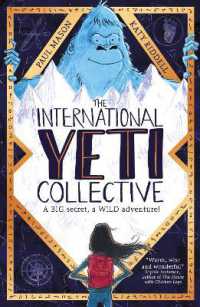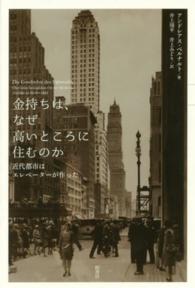- ホーム
- > 洋書
- > 英文書
- > History / World
Full Description
In the Moroccan French Protectorate (1912-1956), the French established vocational and fine art schools, imposed modern systems of industrial production and pedagogy and reinvented old traditions. Hamid Irbouh argues that the French used this systematic modernisation of local arts and crafts regulation to impose their control. He looks in particular at the role and place of women in the structures of art production and education created by the French- that transformed and dominated Moroccan society during the colonial period. French women infiltrated the Moroccan milieu, to buttress colonial ideology, yet at critical moments, Moroccan women rejected traditional roles and sabotaged colonial plans. Meanwhile, the contradictions between reformist goals and the old order added to social dislocations and led to rebellion against French hegemony. Irbouh examines and analyses these processes and demonstrates how Moroccan artists have struggled to exorcise French influences and rediscover an authentic visual culture since decolonisation. This book reveals that the weight of colonial history continues to weigh heavily on artistic practice and production.
Contents
Archive Centres and Libraries Mentioned in the Text
List of Illustrations
Acnowledgements
Introduction
The Establishment of French Colonial Hegemony over Morocco
Contemporary Moroccan Scholarship on Moroccan Art Production
French Colonial Art Education in Morocco
Book Outline
Part One: Classifications and Associations
Chapter One : Framing Morocco's Crafts
Chapter Two: Diffusing Colonial Order
Part Two: Design and Process of Colonial Education
Chapter Three: Colonial Mass Education
Chapter Four: Vocational Schools for Men and the French Infiltration of Morocco's Traditional Industry
Chapter Five: Women's Vocational Schools
Part Three: Originality, Drawing and Colonial Exploitation
Chapter Six: Vocational Training and Patriotism in France
Chapter Seven: Drawing as an Apparatus of Exploitation
Chapter Eight: The Open Workshops and the Casablanca School of Fine Arts
By Way of Conclusion: The Burden of Cultural Decolonisation
The Populists
The Nativists
The Bipictorialists
Notes
Bibliography
Index








